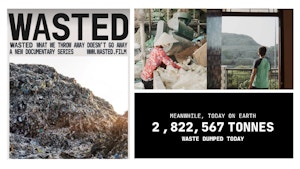Waste Management News

Transport
Singapore-flagged palm oil tanker dumping oily waste in Malaysian waters reveals pollution law flaw
Although it is legally permissible, critics say the discharge of waste by palm oil vessels flushing out their tanks off the coast of Malaysia is an overlooked problem.

Building these facilities is now the government's strategy to waste disposal, though some have called the move misguided. Speakers at the Kuala Lumpur premiere of Eco-Business's film 'Wasted' called for the focus to be on education instead.

Policy & Finance
Are China’s blue carbon credits a free pass to harm its oceans?
The purchase of blue carbon credits should only be considered if directly remediating environmental damage is not possible, experts say.

Nitrogen fertilisers, manure and other agricultural sources drove almost three-quarters of human-caused nitrous oxide emissions in recent years.
Food & Agriculture
Indian heatwave exposes a cooling challenge for fresh food
Waste Management Opinion

The focus of Delhi’s existing solid waste management policies is not on curtailing ever-increasing consumption and production but making waste invisible or incinerating it for profit.

There is still ambiguity in how penalties for bad waste management are enforced. The lack of data on the waste being imported into Malaysia makes it difficult for authorities to assess the risks associated with transboundary waste imports.

Carbon & Climate
Strengthening Asia’s voice for sustainable development
Eco-Business has launched new subscription plans for our community. We invite you to support our independent journalism and thought leadership initiatives to forge a sustainable Asia and beyond.

Asean states need to unite on a common stand to beat plastic waste, but national and local efforts matter too.
Carbon & Climate
Climate change poses dire health and human rights risks
Waste Management Videos

Launched as policymakers lock horns with petrochemicals lobbyists over a treaty to end plastic pollution, the documentary produced by Eco-Business asks why opportunities to solve humanity's waste crisis are being wasted. It will premiere in Singapore and screen on the sidelines of the upcoming COP28 climate summit.

The Green Mortician is the city-state's first water cremation service, which has a small carbon footprint compared to traditional funeral options.

Watch: Singapore researchers are trying to give banana skins and coconut husks a new lease of life in water purification kits that can be used in disaster situations. They could one day also be used in the manufacture of batteries.

Food & Agriculture
Singaporeans love food, but are they valuing food enough?
EB Studio
Singaporeans are well-known foodies, but around 800,000 tonnes of food is wasted every year. Why is so much food wasted, and what can consumers do about it?
Waste Management Podcasts

Why is there so much secrecy and controversy around sand extraction? Eco-Business speaks to Madhumitha Ardhanari to find out more about the narrative surrounding sand in Singapore, the largest importer of sand in the world.

Manufacturing
Sustainable packaging is here — but who will pay for it?
EB Studio
As a landmark treaty is thrashed out to tackle plastic pollution, the Eco-Business Podcast debates whether the world is ready to pay a premium for packaging that doesn't damage the planet.

EB Studio
Clarissa Morawski from non-profit Reloop tells the Eco-Business podcast why the circular economy is key to the post-Covid recovery.

The World Economic Forum – best known for its Annual Meeting in Davos since 1971 – has been a dynamic platform bringing together the best in business, politics and society to shape global industry agendas. How is WEF helping to shape China’s economic goals alongside its environmental and societal priorities?
Waste Management Press Releases

Plastics Industry Development Center
Creative stationery made from recycled marine waste to awaken environmental sustainability

United Nations Development Programme
US$135-million UNDP, GEF initiative will support small island developing states tackle drivers of environmental degradation

UN Environment Programme
US$134-million initiative aims to eliminate mercury-containing medical devices

AMITA HOLDINGS CO., LTD.
Amita Holdings and Re Sustainability, the largest waste management company in India, sign MoU

United Nations Environment Programme (UNEP)
World squanders over 1 billion meals a day: UN report
Waste Management Research

WWF-Singapore (PACT)
PACT Impact Report 2021

Lendlease and WWF-Singapore
Circularity in retail - Tackling the waste problem

WWF-Singapore
The business case for a UN treaty on plastic pollution














